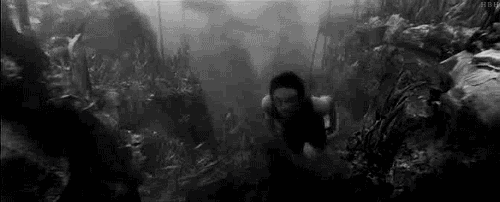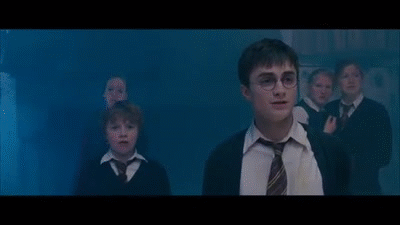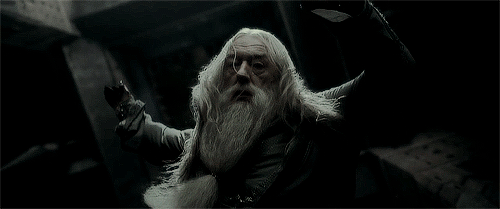For a child with a love of literature, the pages J.K. Rowling penned in the Harry Potter series were an immersive experience, one that we viewed alongside our heroes and villains. At some level, we felt their joys and fears, and we cheered and cried for them as easily as we might for a friend.
We're apparently still spellbound even today, as the Fantastic Beasts movie series takes root and the Cursed Child play thrives in London and prepares to come to America.
With the series' legacy still alive and strong, I figured it was time I try my hand at ranking the tales that left their mark on my youth. Each has its own magic and is special in it's own way. I have read each about twenty times, and none has grown old.
A note: this ranking is not based entirely on which of the books is my favorite, but on which I think are the most impressive. Also, SPOILER ALERT if you haven't read the books.
1. Goblet of Fire
The fourth entry in Rowling's series is not my favorite; in fact, for awhile it might have qualified as my least favorite. This ranking, then, is a testament to Rowling's prowess as an author. For starters, it's here that she expanded the world of magic beyond the borders of Britain to the world at large.
More impressively, though, she managed in this entry to change overall tone of the entire series. The first two acts of the book still read to some degree as a children's novel – Harry and his friends are in danger, but we never really doubt their safety. Rowling shows her masterful skill and a willingness to write with high stakes, though, as the last act sees a student torture another student (albeit not of his own free will), the return of Lord Voldemort, and the first death of a Hogwarts student.
The shift is sudden and harsh, and for all the fun of the series, it very effectively hammers home the fact that in a world such as Harry's, the stakes would realistically be very high.
2. Order of the Phoenix
Informally, it seems to me that this is majority of Harry Potter fans' favorite book of the set. Though it isn't mine, it's not hard for me to see why they feel that way – if Goblet of Fire was the transition to a more adult tone, Order of the Phoenix fleshed it out. It balances the adolescence of its characters with some compelling, mature narratives about topics such as governmental influence and grief.
It also goes far in developing Harry. We see how Cedric's death affected him in his reluctance to accept help when in danger. The strength of this arc is that he fluctuates – rather than following a linear path, we see him go back and forth between working with his peers and in isolation from them. That grief is explored further, and very powerfully, in his loss of Sirius. Throughout, it starts to really scratch the surface of understanding the connection between Harry and Voldemort.
And of course, the book gives us the first villain that was really heavily present (Voldemort often exists in the books as a distant rather than an imminent threat) in the subversively power-hungry and prejudiced Dolores Umbridge.
3. Deathly Hallows
Rowling's finale is my favorite for a lot of reasons. I admit that it is not the best of the series – it drags a bit in some spots, almost completely isolates us from the character arc of many important players for significant amounts of time, and as such only follows a few characters for much of its length... but when it works, it works as well as and even better than the other entries.
The book really follows three prominent plot-lines: the faults of Dumbledore, the strains on Harry, Hermione and Ron's friendships, and the search for Voldemort's Horcruxes, all while his reigns over a puppet Ministry of Magic.
Many authors grow in their ambition with success, and this book shows that Rowling is no different; she succeeded where many others have failed, however, in creating a plot that gives each of these narratives a resolution that resonates in the overall conclusion of the book. And here, the stakes are higher than anywhere else – when we reach the climax and the characters temporarily ignored are rejoined, she is able to mine some serious emotion.
And of course, the book contains my two favorite sequences in Harry Potter: Snape's memories and the death/dream sequence with Dumbledore.
4. Sorcerer's Stone
With the bizarre wonder of a Roald Dahl novel, Rowling introduced us to the greatest fiction series this side of Lord of the Rings. It's compact, but we learn about Harry's character and his plight, come to love his friends and dislike his aunt and uncle, and most importantly, we get an intimately crafted and detailed magical world. It's much less ambitious than the listed top three, but it also masterfully laid the groundwork for her massive expansion of the storyline later in the series.
5. Half-Blood Prince
This one got me more emotional than any other in the series – it's conclusion had me in heavy tears. Albus Dumbledore may well have been my favorite character, and it's hard for me to put this book so low on the list because it began developing his character more than any other. It also was the first really solid work Rowling did on romantic relationships in the series, and it set the stage for the Snape plot twist in book seven. It's placement here isn't for lacking anything – it's rather just a testament to the strength of the series.
6. Prisoner of Azkaban
The biggest knock against Rowling's early books in the series isn't really a knock at all. Their shorter length is a weakness in some ways, but it befits the fact that most readers at the time of release were children. Prisoner of Azkaban, however, is an excellent continuation of series theme of learning to face fear (something that began in book one with the fear of Voldemort's name). And of course, it allows us a chance to see Harry connect ever so briefly with a true father figure, first in Lupin to a degree and then, of course, with Sirius.
7. Chamber of Secrets
This is one of the few lists on which there is no shame in finishing last. Chamber of Secrets is still a top-notch novel that does much to build the world of Harry Potter, introduces key characters, and whisks the reader away to the world of magic.
The only flaw, which does bear mentioning, is that this is the one situation where one could really argue that either Hogwarts should have been closed or that Dumbledore should have easily been able to solve the mystery of the Chamber of Secrets (it was under a stall of sinks and it was not altogether difficult to find out that the Basilisk was traveling in the pipes). Nevertheless, it was still a heck of a read.










 Photo by
Photo by  Photo by
Photo by  a group of people sitting around a table with laptopsPhoto by
a group of people sitting around a table with laptopsPhoto by  people on beach during daytimePhoto by
people on beach during daytimePhoto by  Photo by
Photo by 







